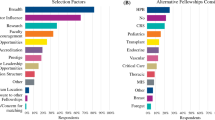Abstract
Background: Data that document academic status after surgical oncology fellowship are sparse. This study was done to report the academic status and clinical practice of graduates of a major surgical oncology program.
Methods: During the 10 years that ended in 1994, 68 fellows graduated. Each was surveyed about current academic status, number of jobs, job satisfaction, hours worked per week, and clinical practice. During 1995 and 1996, 11 fellows graduated. From this group, data were available on clinical practice while in fellowship (n = 6) and from the most recent year (ending July 1997) in a new position (n = 8).
Results: Sixty-seven of the 68 (99%) who were fellows from 1985 to 1994 returned surveys. Most (69%) are in “academic full-time” positions. Of those who listed an academic rank, 51% and 27% are assistant or associate professors, respectively. Job satisfaction was reported at a mean of 4.2, median of 5, on a scale from 1 to 5, with 5 being the best. Seventy-one percent remain at their first job, whereas 26% have had one previous position. The median number of hours worked per week was 70 (range, 45–100). Time allocation was patient care—60%; research—20%; education—10%; and administration—10%.
Conclusions: Surgical oncology fellowship results in the majority placed in academic surgery, satisfied with their positions. Graduates are prepared for current practice patterns, and surgical oncology fellowship training should be suggested to residents interested in academic medicine.
Similar content being viewed by others
REFERENCES
Greco RS, Donetz AP, Mackenzie JW, Brolin RE, Trooskin SZ. Career development of residents in university and independent training programs: the influence of special training fellowships, type of practice, specialization, and research. Surgery 1986;100: 312–20.
Skinner DB. Presidential address: Society of University Surgeons. Recruitment and retention of academic surgeons. Surgery 1979; 86:1–12.
Crumley RL. Survey of postgraduate fellows in otolaryngologyhead and neck surgery. Arch Otolaryngol Head Neck Surg 1994; 120:1074–9.
Author information
Authors and Affiliations
Corresponding author
Rights and permissions
About this article
Cite this article
Heslin, M.J., Coit, D.G. & Brennan, M.F. Surgical Oncology Fellowship: Viable Pathway to Academic Surgery?. Ann Surg Oncol 6, 542–545 (1999). https://doi.org/10.1007/PL00021735
Received:
Accepted:
Issue Date:
DOI: https://doi.org/10.1007/PL00021735




